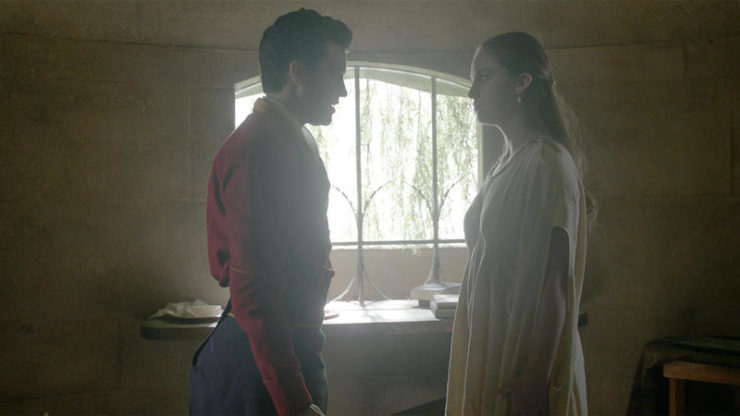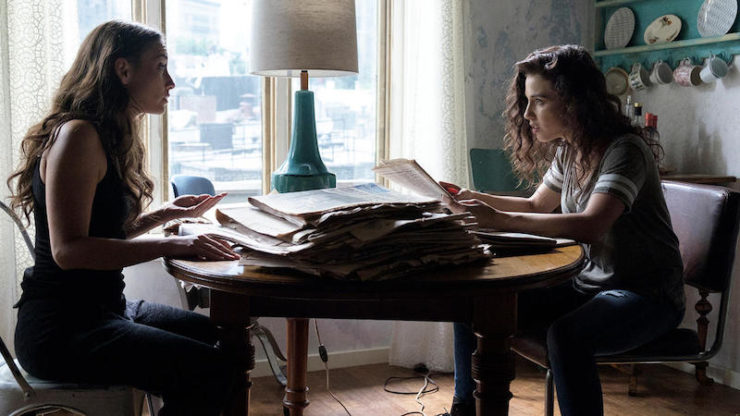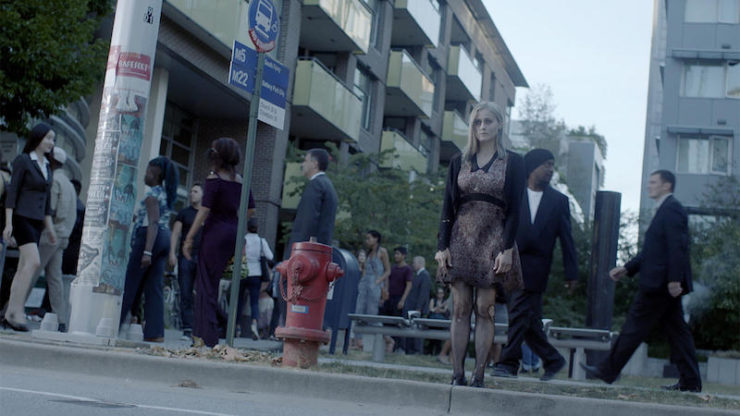The farther we get into season two of The Magicians, the more season one feels like the prologue. Finding out magic is real, that magical worlds are real, and that not everything magical is nice and wonderful—that’s the introductory text. The real meat of this story is what happens next: How do you rule the magical kingdom? What do you do when magic fails you and you want it back? And how do you deal with trauma that, while magical in origin, is trauma all the same?
In Quentin’s case, the answer is, essentially, “poorly.” But “Cheat Day” gives us someone who’s even worse at processing grief than Quentin is:
Emily Greenstreet.
We met Emily, briefly, last season, but not long enough to get a sense of her. She’s the former Brakebills student who tried to change her face to woo back the professor she loved. Alice’s brother, Charlie, tried to help her fix it—and wound up a niffin in the process.
Quentin gets more than just a sense of her after Dean Fogg gets him a job at Plaxco, which appears to be a company largely staffed with no-longer-practicing magicians who are expected to do very little work. There’s a fireplace in Q’s office, and two different people ask if he’s masturbated in the office yet. Work ethics are not at the top of anyone’s list of concerns, but wine-soaked lunches are. And over the course of what appears to be one long, booze-soaked day, Quentin discovers that it is possible to be sadder, more defeated by grief and regret, than he is.
“I don’t blame myself. Except for when I first wake up. And when I go to bed. And all the time in between,” Emily says. But she brushes all that off, insisting that today is cheat day. Her grief is all denial: She doesn’t use magic. She doesn’t blame herself. But she does—both things, all the time. On cheat day, the person who gave up magic can do a spell to create a smoke horse that calls back to Alice’s glass horse (which Charlie taught her to make). Or an illusion spell that turns Quentin into the person she misses, which brings everything full circle when he appears as Mayakovsky.

Mayakovsky, “the drunk perv in the igloo,” who’s currently helping—maybe that should be “helping”—Penny with his new hands. Hands that are useless for magic, though Penny can still travel (which presumably made getting to Brakebills South easier than the gang’s first trip). While Quentin discovers the depths of Emily’s sadness, Penny learns the source of Mayakovsky’s bitterness: he’s in exile, trapped by “incorporate bond.” It was go to Brakebills South for good, or give up magic—which is rather like what Dean Fogg suggests to Penny at the start of the episode. Go try to learn from Mayakovsky, or go back to the mundane world, where Quentin is.
I love the deal Penny and Mayakovsky make, how vague the professor is about the help he needs with his “project.” He’s figured out that something is happening to magic and is trying to make a magic battery, which will surely become a plot point again somewhere down the road. But he’s also here to deliver some drunken truths to Penny. “If magic goes, it will be very bad time to be magician, so consider the advantage of getting out now.”
Penny’s not going to, which is probably fine with Mayakovsky, who needs some magical moss from Fillory. And what’s happening in Fillory? Well, regal babies and attempted regicide, for starters.

It seems entirely logical that in Fillory, a pregnancy test is a rabbit that says “pregnant!” in a cartoonish voice. And it’s equally logical that Eliot is hugely conflicted about becoming a father: he’s sincere enough when he wants to toast the news (with his latest terrible attempt at champagne), but his anxiety later, about the template provided by his own father, is not easily resolved. Especially when some dude tries to choke him and, after the would-be assassin is apprehended, his councilors unabashedly show their super classist side. “When we’re the least snobby people in a room, there’s something wrong with the room,” Margo observes.
Margo: “When was the last time either of us dealt with a political insurgency?”
Eliot: “Unless getting kicked out of a fivesome counts … first for me.”
Margo: “Same.”
Fillorian politics are not quite as simple as the storybooks made them out to be. Given how shitty everyone else’s situations are, Eliot’s predicament seems almost normal: the native Fillorians are tired of Children of Earth showing up and taking the crowns. “Tell Ember,” Eliot protests. He’s correct that Ember issued the decree about who could rule, but he’s also not willing to step aside. Eliot’s lessons in royal privilege are continuing—and he’s obviously learning, given his choice to go talk to Bayler, the assassin, and ask what he would do.
Royal privilege only goes so far, though, as Margo finds out when she disagrees with Eliot’s choice not to execute Bayler. “The queen may voice her opinion, but ultimate judgment belongs to the king,” she’s told.
Margo: “So this is what the patriarchy smells like? It’s not the freshest.”
Eliot is thinking about the future, about the child he and Fen are going to have, and Margo’s endless pragmatism is at odds with that. Their research showed that execution is the more common (and successful?) option, so she votes execution. Eliot wants to reach for an ideal. And neither of them are factoring in Fen, who gains another intriguing facet when it becomes clear that she and Bayler go way back. He tries to boss her (Fillorian patriarchy in action!), but she’s learned a thing or two in the castle—and she, like Eliot, is making choices about her child now as well. She tells Bayler, “If the FU fighters make another move, I’ll kill you myself.”
Suddenly, Fen is really quite interesting.

The patriarchy is overtly a problem in Fillory, but also, and more terrifyingly so, in Brooklyn, where Julia is facing yet another unwanted consequence of her encounter with Reynard: She’s pregnant. This is no wanted-but-unexpected royal baby. This is something else entirely, and Julia’s fury about it is matched only by Kady’s careful, gentle calm. You can see her calculating what Julia needs, how to help her, how to be a rock for her: “I’m your best bitch, remember?”
Her calm practicality extends, so refreshingly, and so importantly, to how the show treats the entire situation. This is no dangers-of-magic after-school special, but a thoughtful, practical presentation of what Kady describes as “a simple, totally mundane procedure.” It doesn’t matter that it might not be a “simple, totally mundane human embryo.” It doesn’t matter that Julia doesn’t know if it’s Reynard’s or Richard’s. “Right now,” Kady tells her, “it is just a clump of cells.”
They go to a clinic; the doctor is kind, patient, understanding. That night, when Julia says she feels lonely, Kady understands. She’s been there. She’s also had an abortion.
They go back in the morning to get the procedure done.
And the patriarchy rears its ugly head.
This part of the episode is really difficult to watch. The more we see of Reynard, of what his power does, the more we see that he’s a nightmare vision of misogyny and cruelty—a manifestation of all the worst things men might do to women. And here the show takes it one step further, drawing clear parallels to extremists who would ban women from getting abortions even in the case of rape, but not hesitate to murder doctors who perform those abortions. When Julia and Kady return to the clinic, every un-warded woman Julia comes into contact with changes, like a switch flipping, into a person standing in her way. The receptionist’s face goes cold and she deletes Julia’s appointment. When Julia gets in to see the doctor, all goes well until it’s time for the actual procedure. “Morning cobwebs,” the doctor says, brushing off her inability to put the equipment together. And then her face changes, too, and she picks up something sharp.
“I can’t,” says the doctor, vacantly, distantly, when Julia screams at her to stop aiming the sharp instrument at her eye. Whether it’s Reynard, his spawn, or some combination of the two is unclear, but the results are deadly.
Julia has been fighting the establishment, the patriarchy, every step of this story. The people who wouldn’t let her into Brakebills. The man in the bar who thought it was funny to scare her into using her then-minor ability at spells. And Reynard, from whom she can’t seem to escape, who destroys so many women before they can help each other work against him.
Julia has Kady. She’s not alone. But magical and structural misogyny are against her. I appreciate how pointedly the show handles what it’s putting her through, but oh, do I want our girl to catch a break.

Meanwhile, in Manhattan, a million miles away from Julia, Quentin drags himself out of bed after his drunken night with Emily—a night complete with wine-soaked, bad-idea, illusion-driven sex with Emily-appearing-as-Alice.
Quentin: “Last night was … It felt really good and it was probably exactly what I needed. But it was also really weird and sad and I feel awful. I feel worse than before.”
Emily: “Apologies for my terrible life.”
Quentin: “I just don’t want to use magic like that. I’m sorry for everything you lost.”
If Emily’s grief is stuck in denial, Quentin’s, at least, is changing form. Eventually, he pushes send on an email to Alice’s parents, telling them their daughter is dead. It’s as much about Quentin as it is about Alice—about his guilt, his feeling that he should’ve died instead. “It’s what she always wanted, to shoulder all of the weight,” he writes. “She was who we all wanted to be.”
And then there she is, across the street, mouthing “Help me,” her stockings still scorched from that last battle. Niffin Alice is dead. Who or what is this? And did she mean for Q to almost walk in front of a bus while trying to get to her?
MAGICAL TIDBITS FEEL TONALLY WRONG, BUT ANYWAY
- FU Fighters, you guys! I’m with Margo; I laugh every time they say this.
- “I would like to raise my child in a world that does not just kill its problem away. We hear them and we address them accordingly.”
- The execution vs. diplomacy board. So depressing.
- “I knew the difference between magic and miracles. One is real and one is a lie with sparkles.”
Molly Templeton is going to go back and comfort-watch the goofy episode where they have to do weird tasks in the woods.










